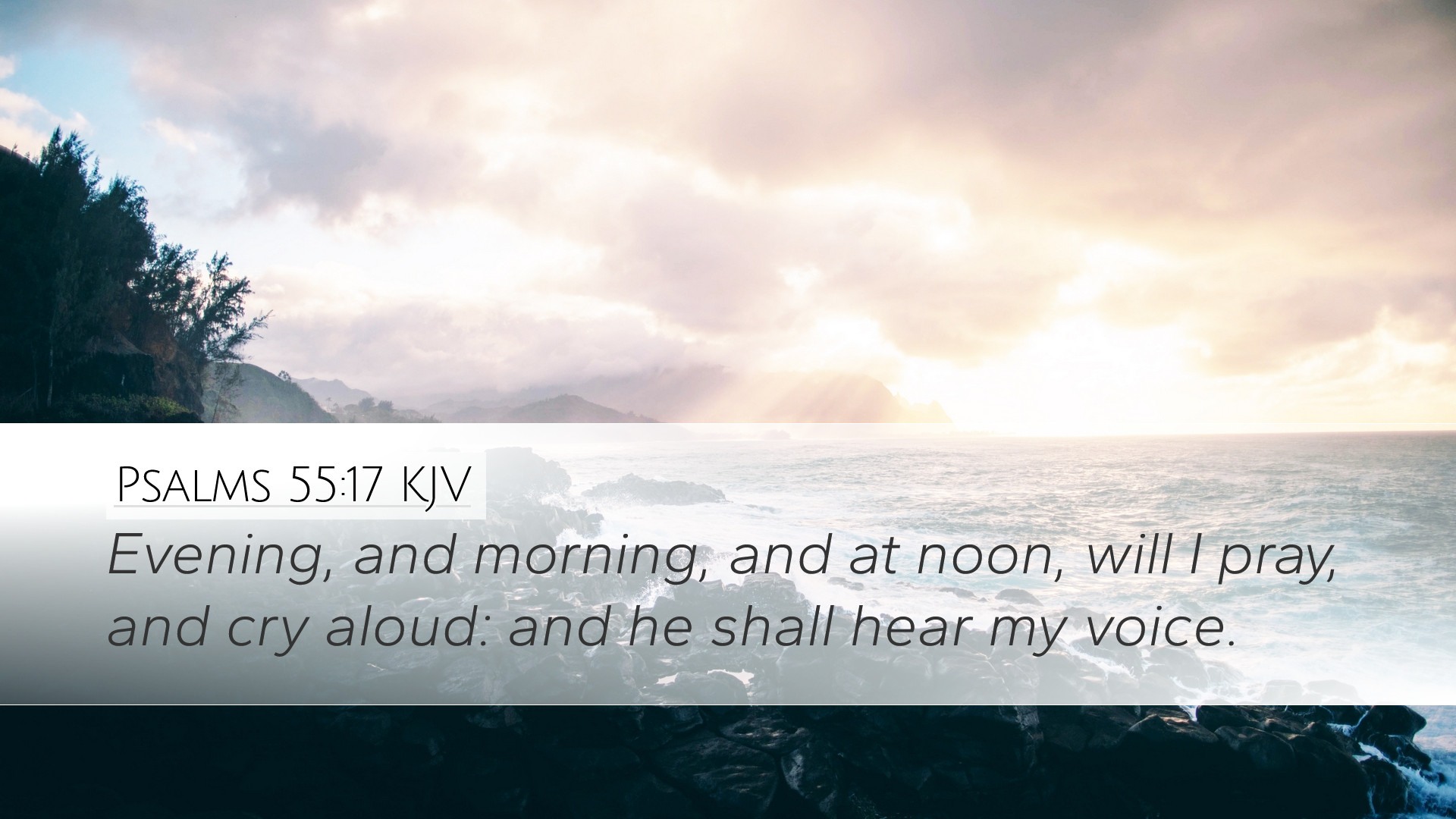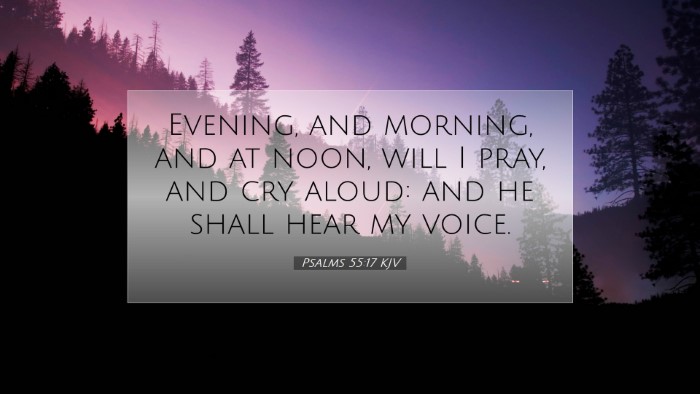Psalms 55:17 Commentary
Bible Verse: "Evening, and morning, and at noon, will I pray, and cry aloud: and he shall hear my voice." (Psalm 55:17)
Introduction
This verse from Psalm 55 captures the essence of diligent prayer and emphasizes the importance of a consistent prayer life. The psalmist, traditionally attributed to David, illustrates a heart that is earnest and consistent in seeking God, irrespective of the time of day. Through this commentary, we will explore the theological implications, practical applications, and reflections from notable public domain commentators such as Matthew Henry, Albert Barnes, and Adam Clarke.
The Context of Psalm 55
The context of Psalm 55 reveals a period of distress for David, likely related to betrayal and a sense of abandonment. The psalmist opens up about intense personal anguish, pleading for God's intervention. This backdrop adds profound weight to the call for prayer, as David seeks solace and strength in his communication with the Divine.
Exegesis of Psalm 55:17
Psalms 55:17 can be broken into three main components:
- Evening: A time often associated with reflection and winding down. It allows for contemplation of the day's events.
- Morning: Signifying new beginnings and hope; the first act of a new day is to turn to God.
- Noon: Represents a moment in the day when circumstances can become overwhelming, necessitating an urgent cry to God.
Matthew Henry's Insights
According to Matthew Henry, this verse illustrates the fervent and varied times of prayer that the psalmist engages in. Henry emphasizes that the rhythm of prayer outlined in this verse illustrates a life punctuated by communion with God, likening it to the necessity of breathing. He notes that the timing of prayers reflects a heart that is oriented towards God at all times, not merely in moments of crisis.
Henry also mentions the assurance that God will hear the cries of His people. Prayer, he argues, should not be limited to moments of formal worship but should be a continuous dialogue throughout daily life.
Albert Barnes' Commentary
Albert Barnes focuses on the frequency of prayer as an expression of dependence on God. He notes that the tripartite structure of "evening, morning, and at noon" succinctly captures the natural rhythms of life, indicating that prayer should engage every aspect of our daily routine. Barnes argues that David's commitment to pray at these times indicates a proactive approach to spiritual health and a deep reliance on divine guidance.
Furthermore, Barnes emphasizes that the act of crying aloud signifies a heartfelt plea. It is not a mere ritual but a passionate engagement with God, revealing the intensity of David’s emotions and his sincere need for God’s intervention.
Adam Clarke's Reflections
Adam Clarke offers a detailed explanation of the Hebrew words used in this verse. He highlights that the phrase "cry aloud" suggests a loudness and urgency that transcends simple conversation. Clarke sees this as an indicator of the psalmist's emotional state, signaling the gravity of the situation that calls for such earnestness in prayer.
Clarke also contextualizes David's prayer as an act of worship. He suggests that the systematic approach to prayer throughout the day fosters a continual awareness of God’s presence and evokes a sense of peace amidst turmoil. This consistent communication with God can be seen as a vital lifeline in moments of distress.
Theological Implications
The decision to pray at all times invites us to consider the attributes of God, including His omnipresence and omniscience. This doctrine reassures believers that God is always listening and present, ready to respond to those who seek Him earnestly. The scripture implores us to cultivate a habit of frequent prayer, reflecting a robust relationship with God that thrives on consistent communication.
This verse also challenges the notion of prayer being confined to specific times or places. Instead, it encourages Christians to integrate prayer into the fabric of everyday life, allowing it to permeate morning awakenings, midday challenges, and evening reflections. Such an approach strengthens one's faith and invites peace in moments of anxiety.
Application for Believers
The practical implications of Psalm 55:17 call for a renewed commitment to prayer:
- Establishing a Routine: Believers are encouraged to set aside specific times throughout the day to engage in prayer, modeling their practice after David's example.
- Crying Out in Distress: This verse serves as a reminder to bring our burdens before God in urgency and honesty, expressing our needs and emotions freely.
- Community Prayer: Followers are challenged to create spaces for corporate prayer, understanding that collective cries to God can be a powerful source of strength.
- Listening for His Response: Consistent prayer cultivates an expectancy to hear from God, paving the way for divine revelation and guidance.
Conclusion
Psalms 55:17 is a powerful testament to the necessity of prayer in the believer's life. The insights from commentators like Matthew Henry, Albert Barnes, and Adam Clarke not only enrich our understanding of the text but also challenge us to evaluate our commitment to prayer. May this verse inspire a deepened dedication to communicate with our Creator, reflecting the deep relational aspect of our faith.


